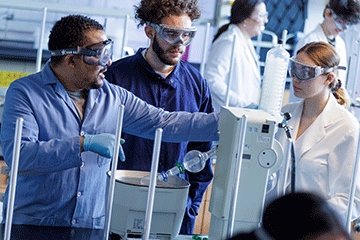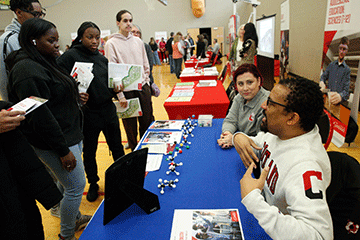
02/16/2024
As a child, Julius Green I would ask his parents questions about the scars all over his body that other people didn’t have. He learned they marked the places where medical science had intervened to save his life.
Just before turning 2 years old, Green was diagnosed with cancer — a stage 3 Wilms tumor. His condition required the removal of both his right kidney and right adrenal gland. Until he was about 5, he would spend much of his time traveling back and forth from the hospital. Green said his earliest memories involved radiation, chemotherapy and surgery.
The tumultuous experience, however, sparked a fascination that would take his life in a direction that defied an unconscious stereotype many people hold about how race aligns with jobs in academia and science, technology, engineering and math (STEM).
“That’s what got me interested in science,” said Green, a SUNY Cortland assistant professor of chemistry.
Green will discuss his journey as a Black man navigating the complexities of chemistry — both in terms of subject matter and social expectations — on Tuesday, Feb. 27, at SUNY Cortland.
His lecture, titled “Finding African American Representation in Modern Organic Chemistry — A Personal Reflection,” will take place from noon to 1 p.m. in Old Main Colloquium.

The talk, which is free and open to the public, continues SUNY Cortland’s Black History Month series of events throughout February.
Green will discuss the chemistry professors who played an instrumental role in helping him along the way, and the crucial need for visibility and equity of underrepresented people in STEM.
“I believe it is important to celebrate diversity in all fields of study, especially STEM,” Green said. “It allows one to see themselves reflected in society, and it breaks down past societal barriers and tropes that paint scientists as only one type of person.”
Green’s journey began with his mother in his home city of Detroit, Michigan. A nursing teacher and nurse, she would show him medical encyclopedias and use the photos for reference.
“‘Oh, this is where the kidney should be,’” he said, describing the connection his mother drew for him.
As he became a cancer survivor, she encouraged him to browse anatomy images and ultimately learn to read full medical encyclopedias.
“Of course, I got interested in other scientific areas.”
Coupled with his countless experiences with doctors at such a young age and desire to provide the help he had received, he aimed to become a physician. More specifically, a hematologist and oncologist — a cancer doctor for children.
Throughout college, his career path switched, and so did his major. After changing from biology to chemistry, Green received his bachelor’s degree from Morehouse College in 2003.
There, his organic chemistry professor, Morris Waugh, Ph.D., set an example for him of a Black male scientist and gave him his start in research.
“I thought chemistry research was too hard and unobtainable to me,” Green said. “Dr. Waugh saw potential in me and encouraged me to get into research even though I didn’t think I was good enough to be a researcher.”
After graduation, Green joined private companies, serving in roles such as quality control chemist and research and development chemist. In 2008, he received an M.S. in biochemistry from Georgia State University. While at Georgia State, Green met another crucial figure in his professional journey: Chemistry Professor Kathryn B. Grant, Ph.D.
“She took a chance on me during my master’s studies at Georgia State University and allowed me to work in her lab while I was a working student,” Green said. “Also, she introduced me to DNA and photodynamic therapy, which I still think are the coolest things ever for cancer treatment.”

During this time, Green began volunteer outreach work for the Georgia Section of the American Chemical Society (ACS), one of the world’s largest non-profit scientific organizations. Seeing the need for more engagement with underrepresented students and underrepresented professionals, he helped restart the Georgia Section ACS Minority Affairs Committee and became active with the national ACS Committee on Minority Affairs.
In 2014, as Green earned a Ph.D. in medicinal organic chemistry from Georgia State University, he worked closely with his Ph.D. advisor, David Boykin, Ph.D., another important mentor.
“(He) allowed me the freedom to explore DNA as a drug target, taught me medicinal chemistry, and supported my outreach activities as a graduate student.”
Green then moved to Washington, D.C., to continue working in education and advocacy for disadvantaged groups. For four years, he served as the first executive director of Empowerment Enterprise II (EE2), a community-based nonprofit serving youth in some of the poorest and most violent neighborhoods in D.C.
After reentering academia full-time in 2019, he served a two-year appointment as a visiting scholar at Bentley University in the Boston area.
Green joined SUNY Cortland three years ago as a Diversity Faculty Fellow, part of the university’s participation in the SUNY-wide PRODiG Initiative (Promoting Recruitment, Opportunity, Diversity, Inclusion and Growth). His lab investigates strategies for improving underrepresented student outcomes in chemical education in addition to medicinal chemistry research.
He still volunteers in education, outreach and youth advocacy throughout the East Coast.
Prepared by communications office writing intern Jean-Andre Sassine Jr. '23